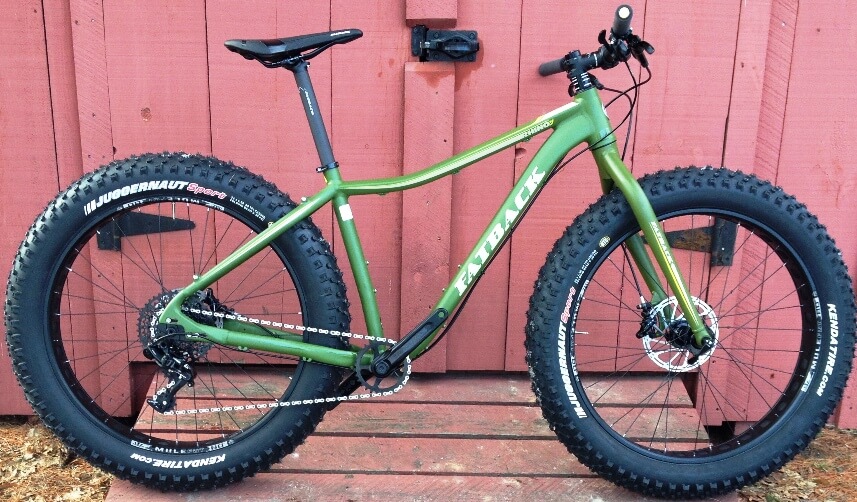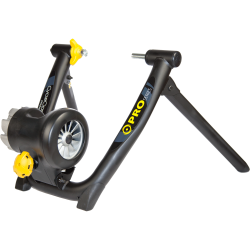Fatback Rhino – An Authentic Fat Bike at a Great Price
The design of the Fatback Rhino follows the same brief as the Fatback Skookum: a go anywhere bike, ready for snow, sand, or the trail. I just finished building a new Fatback Rhino for a client of our Vermont shop and wanted to take the opportunity to talk a bit more about this bike as it falls into that popular ~$2K Fat Bike category.
Fatback Rhino Aluminum Frame
The Fatback Rhino frame is made from custom 6000 series aluminum alloys, and is compatible with both rigid and suspension forks. The Rhino, like its carbon sibling the Skookum, is really well thought out for maximum versatility well beyond just snow riding. The headtube of the Fatback Rhino is tapered, 44 mm at the upper bearing cup, and 56 mm at the lower bearing cup to manage the loads of the big front wheel well and the rear triangle has the wide 197mm rear dropouts that provide enough room to accommodate 4.8″ wide tires on 100mm rims. Because of this, the frame also will accept 27.5″+ and 29″+ wheels, so the bike can go on a diet and take on summer trails with sl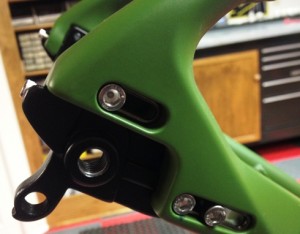 ightly narrower tires as well. The Rhino is available in five frame sizes: 14″, 16″ 18″, 20″ and 22″. For a Fat Bike, that is a lot of frame sizes, as most Fat Bikes come in 3-4 sizes.
ightly narrower tires as well. The Rhino is available in five frame sizes: 14″, 16″ 18″, 20″ and 22″. For a Fat Bike, that is a lot of frame sizes, as most Fat Bikes come in 3-4 sizes.
Fatback uses full length housing on the derailleur cable to protect it from snow and ice build-up and the frame has eyelets for racks if you are looking to take it on a deeper woods adventure or carry tools. Fat Bikes are actually great four season work bikes for hunters and fishers and the Fatback Rhino understands is ready for this use if desired.
Another interesting and considerate feature on the Fatback Rhino frame is the adjustable rear dropout that is designed to allow the owner to outfit the bike as a single speed. The adjustable rear dropouts allow you to make this conversion and adjust the for the proper chain tension. This is a nice feature that further shows the details and thought Fatback put into how their bikes will potentially be used.
Fatback Rhino Fork Choices
Fatback offers bikes in a wide variety of configurations. First of all, they offer a choice of three forks. The first two (to borrow a phrase from the movie “Casablanca”) are the usual suspects: a rigid alloy fork from Fatback, or the RockShox Bluto RL suspension fork. Many, many Fat Bikes with a suspension fork use the Bluto, and it works really well with typical Rock Shox quality.
I said there were three fork options. What is the third? Proving just how core and authentic Fatback is to building the competition capable Fat Bikes, it’s a Lauf fork. 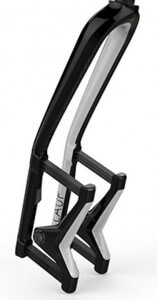 Never heard of it? Not surprising. The Lauf fork does away with the conventional spring technology found on the overwhelming majority of shock forks. Instead, each side of the Lauf uses two sets of flat springs made of military grade S2 glass fiber. It is hard to actually describe how these shocks are designed, and this is definitely a case where a picture is worth, maybe not a thousand words, but possibly a couple hundred. These forks offer 60 mm of travel and they are particularly well suited to Iditabike type Fat Bike use as they don’t have much in terms of moving parts to freeze. The spring rate is progressive, so the further it is “compressed”, or in this case bent, the stiffer the springs become. Two different spring rates are available, based upon the rider’s weight. The result is a very light suspension fork, at 990 grams, with no friction, no stiction, no fumbling with air pressure, no shock oil replacement, no shock rebuilds, no maintenance, nothing, ever. Sounds like a bonus to me. While this design may appear to be more fragile than a conventional shock fork such as the Bluto, Lauf has such confidence in the strength of these forks that they provide a 5 year full five year replacement warranty. If the fork breaks outside of warranty they will have a “no fault” replacement policy and will sell you a new one for 50% off MSRP. How many other fork manufacturers offer such a warranty? The Lauf fork is an intriguing and not inexpensive bridge between a rigid fork and a traditional longer travel suspension fork such as the Bluto.
Never heard of it? Not surprising. The Lauf fork does away with the conventional spring technology found on the overwhelming majority of shock forks. Instead, each side of the Lauf uses two sets of flat springs made of military grade S2 glass fiber. It is hard to actually describe how these shocks are designed, and this is definitely a case where a picture is worth, maybe not a thousand words, but possibly a couple hundred. These forks offer 60 mm of travel and they are particularly well suited to Iditabike type Fat Bike use as they don’t have much in terms of moving parts to freeze. The spring rate is progressive, so the further it is “compressed”, or in this case bent, the stiffer the springs become. Two different spring rates are available, based upon the rider’s weight. The result is a very light suspension fork, at 990 grams, with no friction, no stiction, no fumbling with air pressure, no shock oil replacement, no shock rebuilds, no maintenance, nothing, ever. Sounds like a bonus to me. While this design may appear to be more fragile than a conventional shock fork such as the Bluto, Lauf has such confidence in the strength of these forks that they provide a 5 year full five year replacement warranty. If the fork breaks outside of warranty they will have a “no fault” replacement policy and will sell you a new one for 50% off MSRP. How many other fork manufacturers offer such a warranty? The Lauf fork is an intriguing and not inexpensive bridge between a rigid fork and a traditional longer travel suspension fork such as the Bluto.
Fatback Drivetrain Options
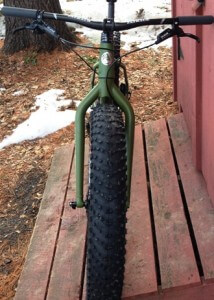 The frame is designed to work best with 1X drivetrains. FatBack offers 4 1 X 11 drivetrain build kits for the Rhino: GX1 4-Season, with SRAM GX1 Gripshift drivetrain and Avid BB7 mechanical disc brakes; GX1 3-Season, with SRAM GX1 trigger shifting drivetrain and SRAM Guide R hydraulic brakes; X01 4-Season, with GX1 Gripshifters operating SRAM X01 rear derailleur and AVID BB7 mechanical disc brakes; and XT 3 Season, featuring Shimano XT drivetrain and shifter with Shimano XT hydraulic brakes. In addition, you can have the Rhino spec’d as a single speed to take advantage of the convertible dropout mentioned earlier.
The frame is designed to work best with 1X drivetrains. FatBack offers 4 1 X 11 drivetrain build kits for the Rhino: GX1 4-Season, with SRAM GX1 Gripshift drivetrain and Avid BB7 mechanical disc brakes; GX1 3-Season, with SRAM GX1 trigger shifting drivetrain and SRAM Guide R hydraulic brakes; X01 4-Season, with GX1 Gripshifters operating SRAM X01 rear derailleur and AVID BB7 mechanical disc brakes; and XT 3 Season, featuring Shimano XT drivetrain and shifter with Shimano XT hydraulic brakes. In addition, you can have the Rhino spec’d as a single speed to take advantage of the convertible dropout mentioned earlier.
Fatback Wheel Options
As with the Fatback Skookum, there are four choices of wheels available from Fatback. These wheelsets are, in order of cost from lowest to highest: Mule Fut alloy rims with SUNringle’ hubs; DT Swiss alloy rims with Fatback hubs; Fatback hubs with Footprint carbon rims; and Industry 9 Torch hubs with Fatback Footprint carbon rims. All of these are solid wheel options at their price point with the Mule Fut and DT Swiss being the most common options at the Fatback Rhino’s most common price points.
Our Client’s Fatback Rhino Build
Our client chose the factory spec’d GX1-3 Season build kit so that he could take advantage of the hydraulic brakes (cable brakes are included in the 4-Season kit). He selected a rigid alloy fork and, as mentioned above, the shifter and rear derailleur are both SRAM GX, for 1X11 drivetrain. The cassette is by SRAM, with a range of 10 to 42 teeth and the crankset is the RaceFace Aeffect Cinch, with a single 30 tooth chainring. The bottom bracket is RaceFace X-Type, designed specifically for Fat Bikes and the brakes are SRAM Guide R hydraulic brake levers and calipers with SRAM Centerline rotors, 160 mm in the rear and 180 mm in the front. All good “no-nonesense” F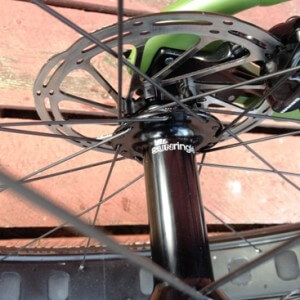 at Bike equipment that is hard to fault.
at Bike equipment that is hard to fault.
The stem and handlebars on the Fatback Rhino are aluminum alloy units by Fatback and the seatpost is Fatback’s carbon post with an aluminum head and topped with a Fatback OEM saddle. The saddle shape is reminiscent of the Fizik Arione type of shape, but with a kick up at the rear. Again, pretty standard issue for a bike in this price range and solid all the way around.
As mentioned, there are a few wheel options on the Fatback Rhino from the factory. The wheel selected by our client are the Mule Fut rims with SUN Ringle hubs designed for 6 bolt brake rotors. The pinned alloy rims are 80 mm wide, and are tubeless tire compatible. The wheels are mounted with Kenda Juggernaut Sport tires (an apt name for a Fat Bike tire), 26″ X 4.5″, with Schwalbe tubes.
Our client’s Rhino, built as set forth, weighed in at 31 lbs. 12 oz. (14.41 kg) in a 18″– slightly lighter than the very pretty ’16 Felt DD30 at a similar price.
Fatback Rhino Pricing
Available in green or blue, prices for the ’16 Fatback Rhino vary from $1,999 to $5,100, depending on your choice of fork, component group, and wheelset. The least expensive complete build, at $1,999, includes a rigid alloy fork, the SRAM GX1 4-Season component group, and the Mule Fut wheelset. The top-of-the-line build, at $5,100, includes the Lauf fork, the XT 3-Season component group, and Industry 9 hub/Fatback carbon rim wheels.
Fatback Rhino Complaints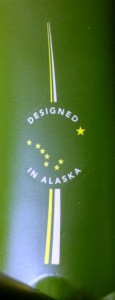
Any complaints about the bike? Just one. The handlebar grips that come with the bike leave something to be desired. As this is the standard grip supplied by Fatback, the same comment applies to the Skookum and the Corvus. If this were my bike, I would swap out the stock grips for a set of Ergon GS1-L grips as I find them much more comfortable. But that is personal preference, and you may find the stock grips to be fine.
Fatback Rhino = Authentic Fat Bike w/4 Season Capability
Fit Werx does Fat Bikes and Fatback is a great choice for many riders as it is one of the most experienced brands in the Fat Bike Business and is a “core” brand that focuses solely on building the best and most versatile Fat Bikes they can. We really like how Fatback takes a “frame first” approach to their Fat Bikes, making sure to think about how to maximize versatility and compatibility in their designs and created from experience as Alaska’s original Fat Bike builder. Fatback not only offers a variety of frame choices and build options, but they do so across a very wide range of prices and with specialty touches that only show up on bikes built by a specialty company.
Interested in winter riding? We carry Fat Bikes bikes from Fatback, Trek, Felt, Moots and Surly to meet every need. Contact us today to schedule a time to try a Fat Bike or to reserve one for yourself!

